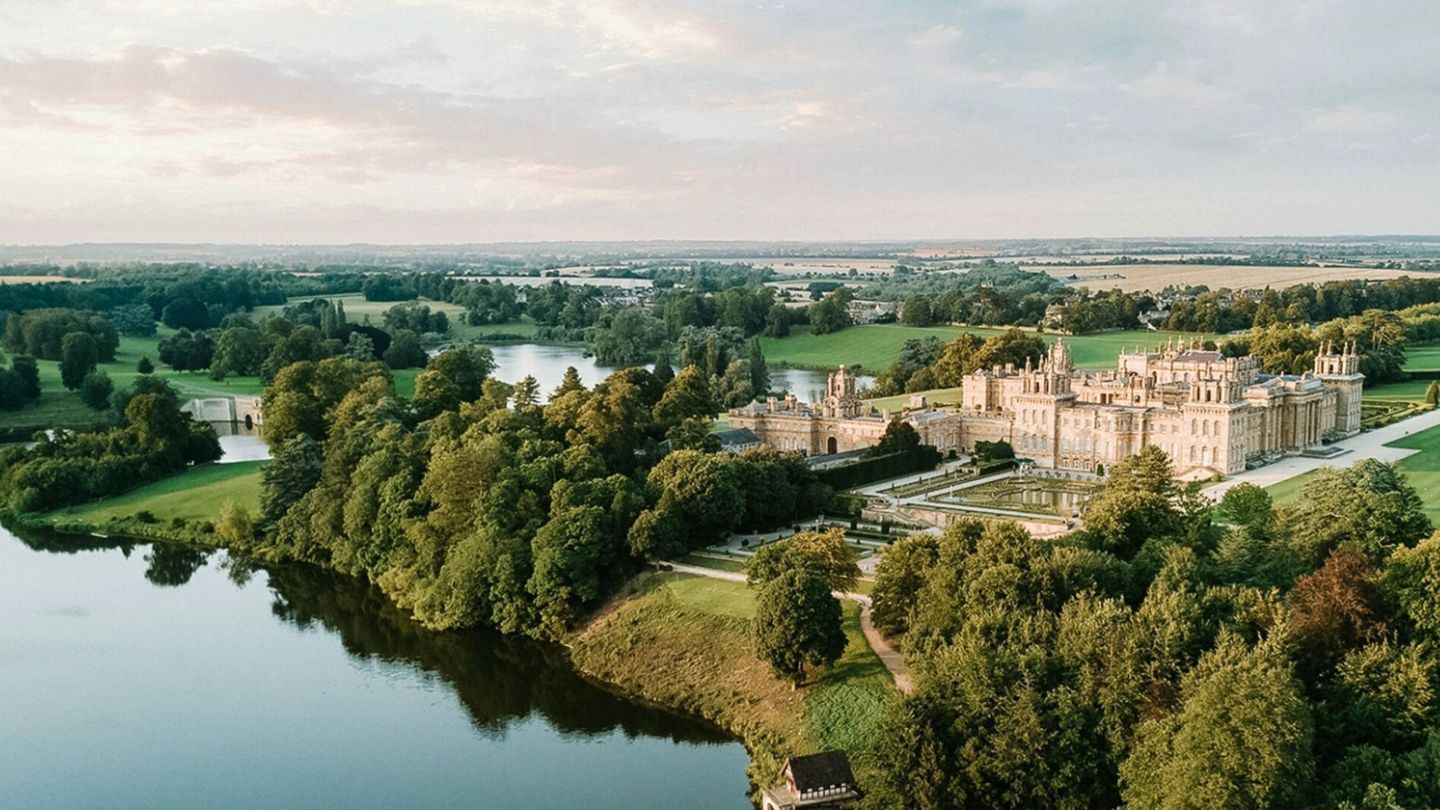

Words: Gentleman's Journal
Photography: Marc Sethi and Lily Bertrand-Webb
They’re the seats of towering dynasties, the spiritual meccas of country pursuits, the ancient monuments to England’s storied past. But in the age of tech unicorns, challenger brand bubbles and ultra-modern disruptors, stately homes might seem little more than pickled anachronisms from a lost age.
As it happens, Cowdray Park, Belvoir Castle and Blenheim Palace are just as motivated by innovation as any IPO-chasing tech behemoth. With this much past, it pays to be interested in the future. In a series of candid at-home interviews, Gentleman’s Journal meets the modern heirs to three of the country’s most historic familial estates…
Perry Pearson - Cowdray Park, West Sussex
The stone inscription above the fireplace in Buck hall — the vast, powder pink, faux-medieval atrium at the heart of Cowdray Park — reads: “Do It With Thy Might.’”
Or, as Perry Pearson, the house’s 24-year-old heir, says: “Just do it — that might be a more modern approximation.” It feels unusual, perhaps, to apply the ultra impulsive Nike slogan to this serene stately home, with its languid perch above the rolling blanket of the South Downs. But, in this game, you better get busy doing or get busy dying.
“Traditionally, estates were run like holiday homes,” says Pearson, sitting in the thick-carpeted quiet of the family drawing room at Cowdray. “Someone got very successful, bought a home, and then used it as a way of doing whatever they wanted — polo, shooting, fishing — without really having to pay.
“But obviously that’s all had to change. That’s not how the world works and there’s no longevity there,” he says. For the Pearson family, scions of the 20,000-acre Cowdray estate in West Sussex, that pivotal moment came about seven years ago, when they made the decision to turn the place into a business as much as a home.
Soon, clan Pearson’s formidable parental team had transformed the house and grounds into a diverse set of businesses — one that could withstand the caprices and shocks of market pressures, crumbling roofs and changeable tastes. The most famous element of all, perhaps, is the Polo Club, and Cowdray has long been the spiritual home of the sport (though Pearson himself jokes that he’s not particularly good at it). The Gold Cup, held in July, is perhaps the pinnacle of the polo calendar, attracting several hundred thousand visitors across the weekend.
“Polo is what people see and it’s the face of the business,” Pearson says. “But there’s a huge amount going on that isn’t so obvious. In the garden we’re building tree houses — essentially these super-high-end tree huts that people stay in.” Other arms of this modern conglomerate include the farm shop and cafe, the golf club, the forestry element, the farm, the self-catering cottages, the event business, the wellbeing centres, the spas.
“We stick to the modern concept where you’ll lose money on each project for the first four or five years,” Pearson says. “And then you’ll begin to pick yourself up. It’s startup thinking, in a way.”
“Traditionally, estates were run like holiday homes. They were used as a way of doing whatever the owner wanted — polo, shooting, fishing — without really having to pay."
All of this will one day come under Pearson’s control — and it’s not a responsibility he takes lightly. “We employ 200 people full time, with an extra 150 people in summer. We house 400 families. We employ another 1,000 people through the tenanted businesses on the estate. That all comes with a social responsibility.
“But the dream is to pass it on to my son or daughter in better nick than it’s in now. That’s the mentality when it comes to estates,” he says. “You’re so grateful that you’ve been given this opportunity, you want others to have the same opportunity that you had.”
George Spencer-Churchill - Blenheim Palace, Oxfordshire
All stately homes are unique, but some are more unique than others. Blenheim Palace (pictured top and the only house outside the royal coterie that is allowed to call itself a palace, by the way) is to country houses what petrus is to plonk. Tourists faint at the sight of its golden belvederes. The Capability Brown grounds are like a Wordsworth poem with added lambs. And where many such houses have been donated to the National Trust, Blenheim is still, at heart, a family home.
“I think that’s one of our selling points,” says George Spencer-Churchill, 26, heir to Blenheim and the Dukedom of Marlborough. “The fact that it’s still lived in by the Duke and Duchess — it’s always created a lot of interest around the place,” he says. “If it was government owned, I don’t think it would be quite so appealing to tourists.”
Tourism, naturally, is one of the main verticals in the Palace’s business strategy — over 800,000 people visited last year and marquee events (such as Countryfile Live, or the International Horse Trials) attract thousands.
“I guess these new ventures are something we’ve had to adapt to,” explains Spencer-Churchill. “And my generation is the most commercially minded of any generation. But gone are the days when these things are kept private from the public — it’s completely uneconomical.
“Maintenance is the big cost. We’re dredging the lake at the moment, which is quite a big project. With silt build-up you need to do these things — and it was built 300 years ago, dug by hand, and hasn’t been touched since!” he laughs. “So that’s a £10m project in itself.”
The tourism arm at Blenheim is overshadowed only by the company’s growing property portfolio. It reaches into the Home Counties (“it’s been expanding since the revolution, I guess,” laughs Spencer-Churchill) and is split between residential and commercial properties.
Around the business-at-large, Blenheim’s corporate team has devised a 10-year plan that rivals that of any ambitious tech startup. Among its tenets, first devised by the duke and the trustees in 2017 — are pledges to become one of the UK’s top 100 employers, to double charitable contributions, to build high quality, affordable housing and to become a net generator of green energy. (The latter is to be achieved by biomass, hydroelectric and solar facilities across the estate.)
"My generation is the most commercially minded. Gone are the days when these things are kept private — it’s completely uneconomical."
At the moment, Spencer-Churchill works in aviation insurance (and owns a pilot licence himself). But one day the responsibility of Blenheim’s future will be all his — if he wants it. In the meantime, he hopes to learn all he can from the set-up at Blenheim. “In an industry like this, you learn the importance of graft,” he says. But the house will always be a home, whether or not he eventually takes the reins of the business — for example, he’s building a new family residence in a more secluded corner of the grounds for himself and his wife Camilla.
“It appeals to me to be a business owner in my own right and it makes sense to do something with Blenheim,” Spencer-Churchill says. “Perhaps one day I’ll own my own insurance company. At the moment, though, we’re just striving to create a better community and trying to make the area a better place. That’s the number one goal.”
Charles Granby - Belvoir Castle, Leicestershire
A five-minute walk from the Houses of Parliament stands a pub named The Marquis of Granby. Popular with MPs, it was for a number of years the de facto location of the UKIP press office. There are several other “MoGs” across the country, but there’s only one actual Marquess of Granby – 19-year-old Charles Manners, Newcastle student and heir to the Duke of Rutland.
The fourth of five children to the 11th Duke, David Manners, and his wife Emma, Granby grew up at Belvoir Castle, the neo-Gothic stately home on the Leicestershire-Nottinghamshire border, with its 16,000 acres, Capability Brown parkland and prime position on top of the hill.
Despite the grandeur of its setting, life in the Manners household is like that of any other family, he says. “We’re really close. Like any other family, we have our arguments and problems.” In 2012, the duke and duchess separated, and moved to different wings of the 300-room castle. “Our parents don’t sleep in the same bed, but we still live under the same roof. It works just like most functional families do — not that we are functional. Most families are slightly dysfunctional.”
When he succeeds his father, the young Lord Granby — Charles to absolutely everyone — will be the 12th Duke of Rutland. For now, he’s more concerned with ploughing his own furrow. Having left Stowe in 2017, he took a gap year to work in France as a chalet host — “the funnest time” — before travelling around southeast Asia. Now, he is in his first year studying business management at Newcastle University, and has recently started a leather company, making bags, belt and wallets to sell on the estate. “I’ve always loved the idea of being an entrepreneur, and the feeling that you can start something from the ground and build it up.” He is not looking for “any charity” from his parents for this. “I went to Spain and bought the stuff myself. I want to do it off my own back.”
The Rutlands brought up their children to work for what they’ve got. “From the age of eight I’ve been out with the gamekeepers or on the farm,” he says. “There’s nothing better than sitting on a mower or planting some more trees. It’s nice to get to know the people [who work on the estate] and show that you’re grounded.” The Manners children had to earn their pocket money — and still do. “University isn’t cheap. I’ve got to try and make money day to day. It wasn’t handed to us on a plate.”
"I’ve always loved the idea of being an entrepreneur, and the feeling that you can start something from the ground and build it up."
In time, he may return to Belvoir. It is still a “maybe”, despite him being the heir apparent in a system of primogeniture where the eldest son inherits. “I didn’t grow up assuming that I’ll be the one to take on Belvoir. It’s always been a case of ‘don’t think about that now, you’ll be called upon in years to come.’”
He is determined to have his own life. “It’s about making something of myself, rather than just having a title slapped onto you and thinking that everything can be hunky dory through that.”
One might imagine that a young man who will one day inherit one of England’s most extraordinary houses, and whose father was once estimated to be worth £125m, might not have a care in the world. “I hate the idea of everyone thinking that I’ve got everything because of my name and family and title. That’s what I worry about, that people think I’m set for life. That isn’t the case.”
Now check out the new tech startups to look out for in 2019…


